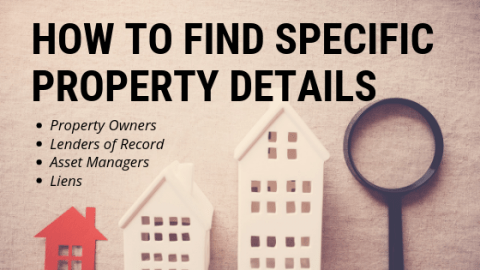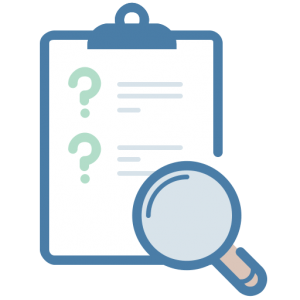
When you need to find out who owns land or property, you can tap into several resources. Some methods are free, and others are paid tools that can be customized to fit specific search needs.
We’ll cover how to search for property ownership details and how you can benefit from some of the best property owner search tools on the market.
Why You Might Want to Find Out Who Owns a Property
When a property falls into disrepair, reaches a distressed or pre-foreclosure status with the bank, or offers significant profit potential, real estate investors benefit from finding property owner contact information.
Once investors determine who owns the property, they can establish communication with the owner to inquire about various property aspects, learn more about deed and property tax histories, and even begin purchase negotiations.
How to Conduct a Property Owner Search for Free
There are several ways to find a property owner’s contact information, and some methods are free. Public records, property tax information, and county clerk offices are the most cost-effective sources, though researchers should expect to spend some time retrieving details on who owns a property.
For one-time property inquires, these low-budget, high-effort options might make the most sense. However, high-volume investors may prefer to hire experts to handle the search.
Find a Property Owner Using Public Records

Using public records to find out who owns a property can be a low-cost way to gather information. Some sources are easier to use than others, and county record websites vary, so there’s a learning curve. Once you’ve established a process and understand how and where to access specific details, you can save a ton of research time.
Property owner names are also available through free and paid public record search websites. However, they might not be the most efficient, accurate method to use. Information isn’t always up to date, and often, you’ll have to sift through irrelevant data. Real estate investors and other high-frequency buyers can benefit most by going directly to the public information source.
1. Visit Your Local County Clerk for Property Records
County clerk’s offices keep people and property records on file. For property ownership records and contact information, this is the place to start. County records track real estate transactions, births and deaths, marriages and divorces, bankruptcies, and business ownership details.
This property record resource can provide valuable insight into a property owner’s status, history, and business ties due to the broad record scope.
2. Call Your Local Title Company
Title companies use public records to verify and find property information like owner name, taxes, liens and judgments, and other legal aspects. A local title company can provide a Focused Real Estate Marketing (FARM) list, including property owner information, addresses, sales comps, and nearby neighbor details. Most lists are free, though you may need to pay a small fee for some.
For timely, low-cost lists, it helps to develop an on-going relationship with a local title company rep. Most reps are happy to assist recurring or established clients, and some companies offer easy-to-use apps and tools that simplify the search.
3. Access The County Tax Assessor’s Website

You know the address, you’ve seen the exterior, but who owns this house? For quick access to property owner details, deeds, and tax records, visit the county tax assessor’s website.
Property tax records are available online and free to access. Most county websites offer searchable databases; researchers enter any known property details to find land owner records. Once you’ve landed on the right property, you’ll find information on who owns it and its histories on deeds, property taxes and assessments, and permits.
How to Use County Websites to Find a Property Address
If you know the property’s location but not its physical address, check out the county’s Geographic Information System (GIS) map. These maps display land parcels, topography, and other geographical details. Most counties provide free GIS access through their websites. Once you’ve loaded the map, zoom in on the property’s general location and click on parcels to find property address and owner details.
4. Buy Curated Lists From Mailing List Companies and Mailing List Brokers
Sourcing property owner information for marketing or contact purposes is easy with the help of a mailing list broker. You can develop custom lists targeting specific addresses, areas, and customer demographics, and often, cell phone numbers and email addresses are included.
Lists are updated frequently, though information still isn’t real-time and can be inaccurate. This method isn’t free, and it’s most effective for high-volume marketing purposes, not in a one-time fact-gathering scenario.
5. In-person
When you need to know who owns a house or property, you can take the traditional approach and talk to neighbors and other nearby property owners. They can be excellent information sources and often provide contact details that would take hours to find by other means.
This method can be time-consuming, though, and you may have difficulty approaching and connecting with neighbors. If you do make contact, some won’t be comfortable divulging owner details, and others might not know the information.
Property Owner Search Tools and Services
Paid tools are great ways to search for property ownership. If you buy a lot of real estate properties or you just don’t have the time or resources to dig into the records yourself, you can let the experts handle the details.
6. Find Owners of Distressed and Delinquent Property with Skip Genie
If you need to find the owner of an abandoned house or delinquent property, consider skip tracing, a process used to find people’s contact details based on past addresses and contacts. Skip Genie is a very easy-to-use tool that lets you search by name or past address and sends you the phone numbers, names, and current addresses you need.
7. Find Liens, Lenders of Record, and more with ProTitleUSA
ProTitleUSA offers a Full State Statute Search that will give you the title’s tax information, open mortgages, judgments against the property and its owner, liens against the property, and much more. Head over to ProTitleUSA to find out more.
8. Find Deep Property Details with CoreLogic
CoreLogic provides verified property records on 99.9% of all U.S. properties. They have records that go as far back as 50 years on a single property, comparable properties, transaction history, the parcel map, and more. If you are looking for a comprehensive property search service, go to https://store.corelogic.com/search.
9. Uncovering Property Ownership With The Deal Machine App (The Easiest Way)
Deal Machine is the fastest way to find the mailing address, mortgage information, and contact details for any property. All you need to do is upload a picture of the property and then Deal Machine will find the owner’s details, contacts, and the property’s sale history. Check out our driving for dollars review to learn more.
How to Make Contact When the Property Owner is a Bank

If a property is bank-owned, you’ll need to determine the lender’s asset manager. Sometimes, asset managers’ titles and contact information are listed on the bank’s website, though not always. You may have to find other means to establish the decision-maker’s identity.
LinkedIn can be a very effective tool for finding REO asset managers if you know how to do it. Check out the Distressedpro.com Professional Podcast episode featuring Jason Lucchesi to learn more about how to contact asset managers on LinkedIn.
Software like BankProspector can streamline the bank contact search. Our members have access to bank data and contact information for 79,958 decision-makers. BankProspector makes it easy to source and analyze the information needed to reach out to a bank.
How Property Owner Searches Help The Buying Process
Learn how to find out who owns a property, and most aspects of the buying process become easier. Not only will you be able to connect with an owner, but you can gain insight into why an owner might be open to selling.
Property ownership records are often accompanied by due diligence data like property status, value, and deed histories, putting you on the path to a purchase.

